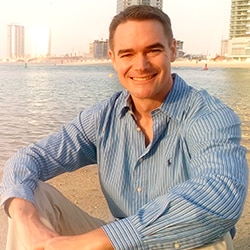
In many ways, the life that Brian Davis and his wife, Katie, have built for themselves sounds like the ideal retirement. For the past four years, the couple lived in Abu Dhabi in the United Arab Emirates and recently moved to Brasilia, Brazil. Over that time, they managed to visit an average of 10 countries per year. “Some of those trips have been longer and more immersive,” says Davis. “One summer, we spent a month living in Genoa, Italy; another year, we lived in Prague, Czech Republic for a month.”

Brian Davis
But this young couple aren’t retired—yet. Katie works as a counselor at an American embassy school; Brian is a co-founder of SparkRental, a website that provides tools and education to help landlords manage their rental properties efficiently and earn as much passive income as possible.
At just 28 years old, Davis says he’s on track to retire within the next five years—a journey he started as he learned about the FIRE (financial independence, retire early) movement and the important role real estate can play in achieving it. “As I watched other people build passive income from buying and renovating rental properties, it occurred to me that not only could I do the same, but with enough of it, I also wouldn’t have to work anymore,” he says. “That was my introduction to FIRE, long before it became a nationwide movement.”
Davis has embraced real estate as a way to achieve an early retirement, though it can be a risky venture. SparkRental helps landlords get the education they need through a blog, video courses, and the largest landlord group on Facebook, and offers helpful tools like a rental property calculator and tenant screening reports. But Davis also understands that real estate, and his entrepreneurial efforts, are part of a larger strategy to secure an early retirement—one that begins with maximizing his savings rate.
“The first pillar of financial independence and retiring early is that your savings rate determines your speed and progress,” says Davis. “Ultimately, you’re substituting a high savings rate for decades of compounding and contributions. So instead of saving 5¬–10% for 40–50 years, you’re saving 40–70% for 5–15 years.”
In other words, early retirement requires packing a lifetime of savings into a few short years. Davis and his wife have pursued this objective in a variety of ways, including taking a fairly simple approach to what money gets saved and invested and what gets spent. “After plenty of financial tugs-of-war, Katie and I agreed that we would live on her income and invest mine,” says Davis. “Whatever she earns, we can spend. But no more.”
To be sure, the couple has some big advantages when it comes to this kind of aggressive savings strategy. Because of Katie’s job working for American embassy schools overseas, the couple receives free housing and pays minimal U.S. income taxes. But even without those advantages, Davis says there are multiple ways to boost your savings without too much sacrifice.
One way is by pursuing what Davis calls “house hacking.” “Because housing is the largest expense for most people, it offers the greatest opportunity for savings,” he says. “My [business] partner Deni house hacks by hosting a foreign exchange student. We’ve house hacked in the past by having housemates.” Other ways to save a lot of money quickly is by getting rid of a car (which AAA estimates costs an average of almost $9,000 per year to own and operate) or by skipping eating meals in restaurant and instead cooking at home.
All of the money you save needs to go into investments that can provide short- and long-term income. Though Davis runs a website focused primarily on real estate, he emphasizes the importance of a diversified portfolio. “Our focus is on rental properties because they come with so many advantages, from leverage to adjusting for inflation to predictable cash flow,” he says. “But stocks should balance your portfolio, which is convenient to do through tax-sheltered retirement accounts.”
Ultimately, Davis believes that changing your mindset about wealth is critical in order to save enough to retire early. “Maximize your savings rate. The higher it is, the faster you build wealth,” he says. “That’s the contradiction of wealth: The more you spend and live like you’re rich, the less rich you’ll actually be.”
A former editor at Los Angeles magazine, Chris Warren has written for publications ranging from Institutional Investor and Forbes to National Geographic Traveler, Oxford American and Greentech Media.
Inset photo courtesy of Brian Davis.
WATCH: Blogger Jamila Souffrant talks about her goals for early retirement in this video.

